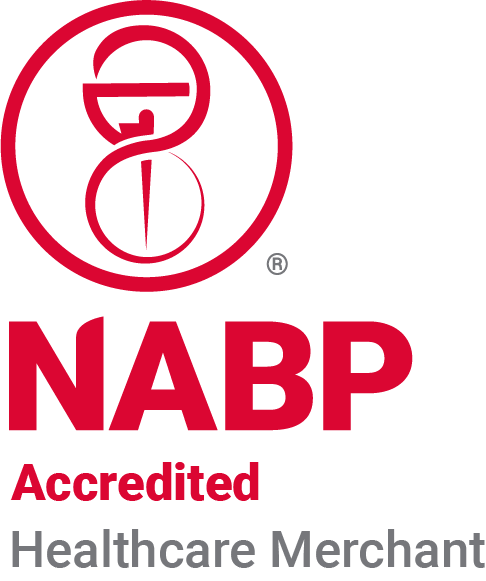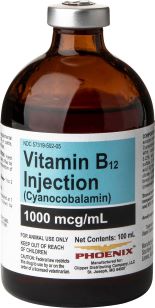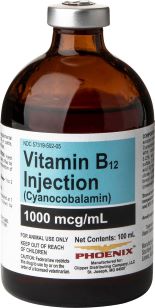Free Delivery on $50+* || Clinic Website
Providing Quality & Trust
Vitamin B12 Injection
Phoenix
Starting at $15.87
$15.87 Each
Detailed Description
General description
Phytonadione is a vitamin and antidote used to treat anticoagulation poisonings that cause vitamin K deficiency.
Uses
Anticoagulation rodenticide poisoning that cause vitamin K deficiency.
How it works
Phytonadione works by restoring Vitamin K1 which is necessary for the synthesis of blood coagulation factors.
Dosage
Dogs and Cats: 1.5 – 2.5 milligrams per kilogram of body weight by mouth every 12 hours. Should be given with a fatty meal.
Cattle, Sheep, Goats, Swine: 0.5 – 2.5 milligrams per kilogram intramuscularly or subcutaneously.
Horses: 2.5 milligrams per kilogram twice daily intramuscularly or subcutaneously for 3 days and then switch to oral.
May require several weeks of treatment.
Forms
Capsules and Tablets: 25 & 50 milligrams.
Injectable: 10 milligrams per milliliter in 30 and 100 milliliter vials
Storage information & handling
Tablet, capsule, and injectable Store at room temperature in light resistant tightly closed container.
What results can I expect?
Replacement of vitamin k1 and resolution of bleeding disorder.
Missed dosage
Give the dose as soon as possible. If it is almost time for the next dose, skip the missed dose, and continue with the regular schedule.
Overdose / acute toxicity:
Overdose is uncommon. Phytonadione is relatively non-toxic.
Side effects
May include:
- Injection site pain or swelling
- Anaphylactic reactions when used IV
Drug interactions
Consult your veterinarian before using phytonadione with any other medications, even other vitamins and supplements. The following may interact with phytonadione:
- Phenylbutazone
- Aspirin
- Chloramphenicol
- Sulfonamides
- Diazoxide
- Allopurinol
- Cimetidine
- Metronidazole
- Anabolic steroids
- Erythromycin
- Ketoconazole
- Propranolol
- Thyroid drugs
- Mineral oil
Precaution
Keep the pet quiet during and for a week after treatment.
Monitor for signs of bruising and bleeding.
Not treating a pet poisoned with anticoagulant rodenticides will likely result in the animal's death. Treatment needs to begin immediately.
Restrict animal's activity until 1 week after treatment is completed.
Vitamin K3 is not effective against anticoagulant rodenticide poisonings.

Powered by nopCommerce
This site is running in live payment mode. Real payments will be processed.

